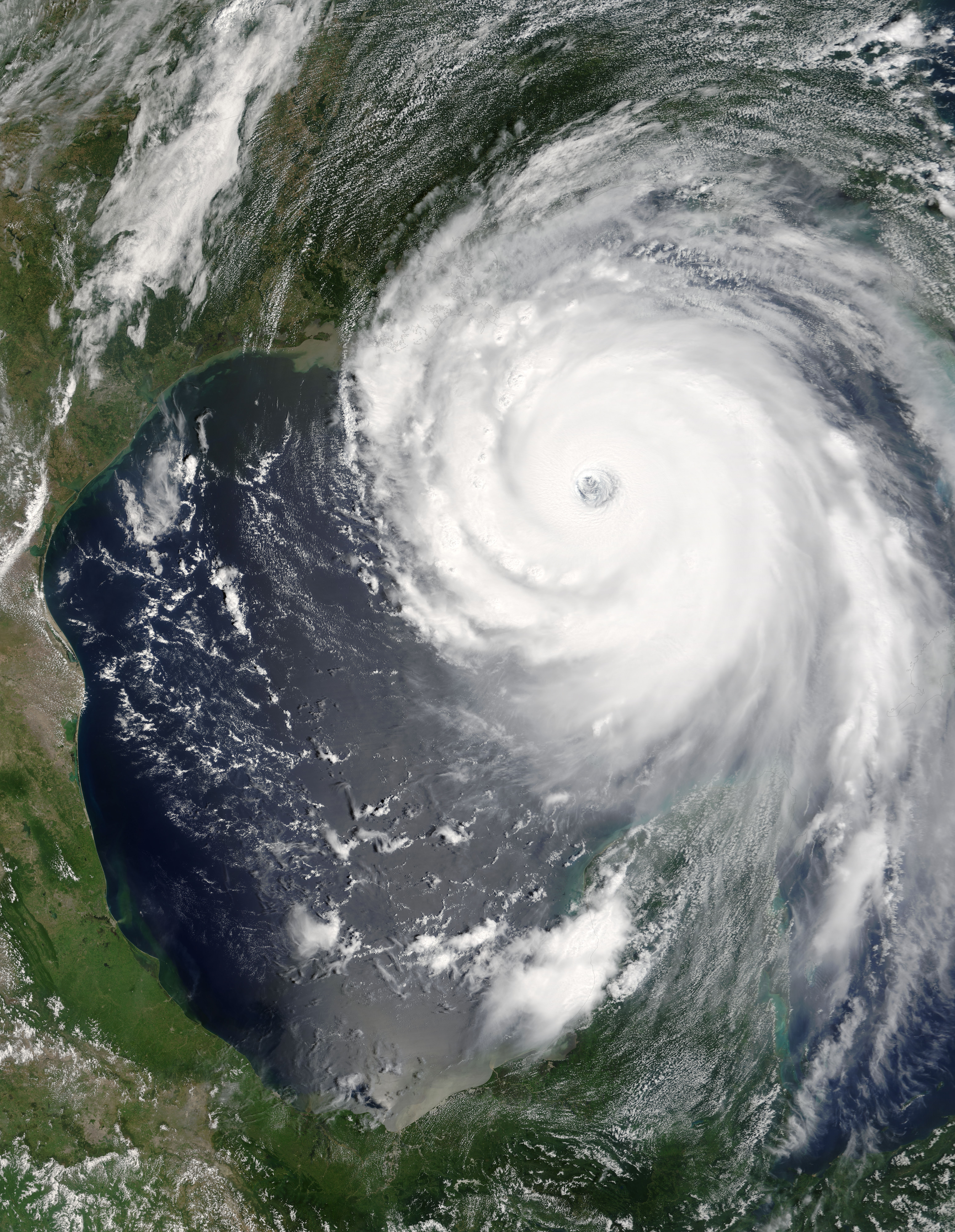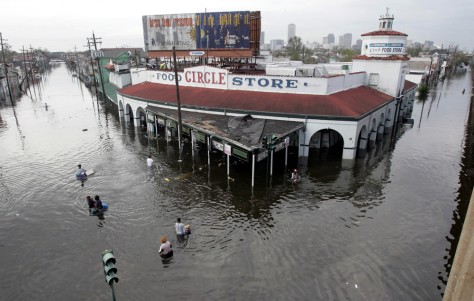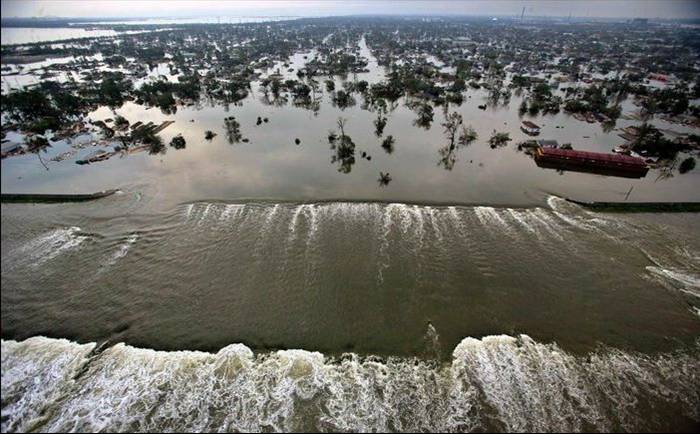Hurricane Katrina Ten Years Later: Administration and Media Still Blaming Michael Brown (And Of Course, Bush)


As we mark the 10-year anniversary that Hurricane Katrina, a destructive Category 5 hurricane made landfall in the city of New Orleans, President Barack Obama have made his comments and payed his respects to the city. More on those in a minute. Depending on which side of the political spectrum you are on will determine what narrative you are willing to believe on what happened in New Orleans ten years ago.
Former FEMA Director, Michael Brown has since come forward in a piece on Politico. He claims his life would have been different had he decided to leave FEMA in 2005, but after the successful responses of Charley, Frances, Ivan and Jeanne in Florida, he was persuaded to stay on-a fateful decision indeed that left him holding the bag for the atrocities and corruption that followed in Katrina’s aftermath.
In his Politico editorial, “Stop Blaming Me For Hurricane Katrina”, Brown states:
“I’m often asked, as the person who was running FEMA when Hurricane Katrina hit, why I didn’t evacuate New Orleans. My response is simple—FEMA had no authority to do that under the Constitution, which clearly establishes a system of federalism in which state and local governments are autonomous governmental entities. We call first responders “first” for a reason. When you dial 9-1-1 your call isn’t answered by an operator at 500 C Street SW, Washington, D.C., 20472. Your call is answered by a local government entity that has first and primary responsibility for a disaster.”
Yes, FEMA could have ordered the evacuation of New Orleans under the Insurrection Act, which Congress ultimately amended in 2006 to permit deployment of troops in response to natural disasters. Brown advocated for this measure and advised Bushto federalize the response. Bush sat with Louisiana Governor Kathleen Blanco and New Orleans Mayor Ray Nagin on Air Force One and outlined his plan and the documents to move this course of action were drafted for Bush’s signature, but according to Brown, Governor Blanco requested time to think it over and eventually rejected the plan.
“As the storm neared New Orleans, all I could do—and did do even before the federalization debate got underway—was go on television, radio and any media outlet my press team could find—and encourage people to ‘literally get your butts out of New Orleans before the storm hits.’-Michael Brown“
As a result of Kathleen Blanco’s decisions and former New Orleans mayor, Ray Nagin, individuals living in the city were asked to evacuate on a Sunday morning, after the hurricane made landfall shortly after midnight. Brown elaborates:
“While I was urging people to leave New Orleans, Mayor Nagin announced a ‘shelter of last resort,’ the New Orleans Superdome. In other words, despite calls to evacuate, if you choose not to evacuate, or are now unable to evacuate because you lack transportation, run to the Superdome.
As a consequence of the mayor’s actions, the people at the Superdome were scared, hot and tired. And the pictures of young, poor mothers with babies in cramped and unsanitary conditions gave the media what they needed. A focal point of fearful, confused citizens in a damaged building, surrounded by floodwaters.”

Brown (AKA “Brownie”) goes on to describe the long chain of events that followed in the days after Katrina and subsequently, his resignation. The corrupt government on the local level, combined with former President Bush’s lack of comprehension of the scope of the problem in the days following, power struggles between Homeland Security the local governments of other states affected such as Mississippi and Alabama and the media jumping all over the story, which ultimately led to the infamous “Resume” article in Time. Brown concludes:
“The American public needs to learn not to rely on the government to save them when a crisis hits. The larger the disaster, the less likely the government will be capable of helping any given individual. We simply do not have the manpower to help everyone. Firefighters and rescue workers would all agree the true first responders are individual citizens who take care of themselves.
Government has a few lessons to learn, too. FEMA was once known for its great partnership with state and local governments. The agency saw its role as an augmenter of state and local response—helping to train, equip and organize first responders at the local level.”
Regardless of what one may think of Michael “Brownie” Brown and his mishandling of Katrina in her aftermath, Brown poses a valid point. A federal agency can only do so much in a disaster when a local government pushes back. By Brown’s account, a great deal of lives could have been saved had Nagin and Blanco embraced a partnership early on in the game and had communication lines not become convoluted. Who is to blame? Brown? Bush? Nagin? Blanco? Landrieu? Jindal? We can point fingers all day long without changing the outcome of this tragedy that still impacts the “Big Easy”.

The Lower Ninth Ward, a struggling neighborhood of mostly poor black families was at the time a New Orleans neighborhood of about 14,000 people. Now fewer than 3,000 people live there. And, of course, POTUS took the opportunity to address the people of the community during his visit yesterday, citing a “colorblind administration”:
“Everyone here knows the disaster and the poverty happened long before that hurricane hit. All the hurricane did was make bare what we ignore each and every day, which is that there are whole sets of communities that are impoverished, that don’t have meaningful opportunity, that don’t have hope and they are forgotten.”-Barack Obama

Obama’s venue was a multimillion dollar community center, built with the help of federal funds after Katrina, that sits only blocks from wreckage that still remains. Nearly one-third of the population lives below the poverty line, more than twice the national average. Despite the surroundings, Obama lauded the community center as: “a symbol of the extraordinary resilience of this city, the extraordinary resilience of its people, the extraordinary resilience of the entire Gulf Coast and of the United States of America.”
Bush had two years to aid in the relief efforts of New Orleans. Obama has almost eight years under his belt. Should he be a big proponent of government funding to rebuild America (the Lower Ninth Ward specifically here), perhaps he should put his money (our money) where his mouth is?
Bush visited New Orleans as well. He and former First-Lady, Laura Bush, visited a school and were quoted (by NBC news) for calling the citizens of New Orleans “resilient” in wake of Katrina’s aftermath (in quotes in the title of the NBC news piece, interestingly.) If you ask me, I would venture to say that our reporters believe Obama when he calls the citizens of the Crescent City “resilient” but the same sentiment does not hold true for their collective opinion on Bush-but that’s just my observation.
Post-Katrina destruction may have been part of a “colorblind” administration. Perhaps we can personalize the hurricane and say that Katrina purposefully hit the Lower Ninth Ward as a form of discrimination against a lower-income, black community (despite it’s geographic location and the storm’s path.) People can believe all of that if it makes them feel better.

Our thoughts and prayers are still with those who lost everything after Katrina. To be honest, though, when I read the mainstream media coverage on the 10 year anniversary, I found it a bit disturbing reading between the lines. President Obama can’t seem to stop pointing his fingers citing a “colorblind” administration for the atrocities 10 years later. Obama said it himself that the Lower Ninth Ward was poverty-stricken before the hurricane and that the people of New Orleans are examples of “moving forward”. Democrats and their media minions love all of this “moving forward” dialog. They like to “move forward” with legalizing gay marriage. They like to “move forward” by not keeping us poor, “oppressed” women in the “Bible-thumping, dark ages” by allowing abortion as a form of birth control. They think more government programs and control is a form of “moving forward” as opposed to independence from the government. But they “go backward” when it comes to a situation in which they play a large part but see little progress.
Leave a Reply